What tea professionals need to know to start the week.
- Good Health News
- Grocery Tea Packaging Innovations
- Tea for the Troops
Health
NEW YORK, NY — Every tea retailer should acquire a copy of the December issue of the American Journal of Clinical Nutrition as it contains a supplement with a dozen authoritative peer-reviewed articles on the health benefits of tea.
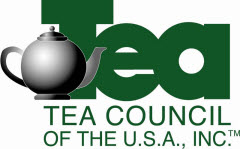 Tea is cited as helping prevent a range of chronic illnesses, including heart disease, certain types of cancer and type 2 diabetes. This new research shows tea has been found to help promote weight loss and maintain a healthy weight, improve bone health and activate areas of the brain that bolster attention, problem solving and mood.
Tea is cited as helping prevent a range of chronic illnesses, including heart disease, certain types of cancer and type 2 diabetes. This new research shows tea has been found to help promote weight loss and maintain a healthy weight, improve bone health and activate areas of the brain that bolster attention, problem solving and mood.
The issue highlights research presented last September at the Fifth International Scientific Symposium on Tea and Human Health which was organized by the Tea Council of the USA a non-profit association that was formed in 1950 as a joint partnership between tea packers, importers and allied industries within the United States, and the major tea producing countries.
Twelve internationally renowned researchers contributed to the AJCN supplement, including experts from USDA, National Institutes of Health, UCLA, University of Glasgow and University of L’Aquila, among others.
“The scientists who contributed their original research and insights are among the best in the world, and together, this body of research has significantly advanced the science of tea and human health,” said compendium editor Jeffrey Blumberg, PhD, Professor, Friedman School of Nutrition Science and Policy and Director, Antioxidants Research Laboratory, Jean Mayer USDA Human Nutrition Research Center on Aging at Tufts University, Boston.
“These new peer-reviewed papers add to the previously-published body of evidence that shows that tea can improve human health—both physically and psychologically,” added Blumberg. “Humans have been drinking tea for some 5,000 years, dating back to the Paleolithic period. Modern research is providing the proof that there are real health benefits to gain from enjoying this ancient beverage.”
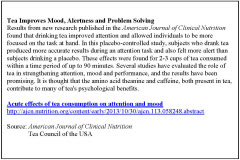 Share these clinical results with your sales staff.
Share these clinical results with your sales staff.
Click here to download a free set of 4 x 6″ cards.
Tea Leaf Polyphenols May Promote Weight Loss
Tea polyphenols and the caffeine content in tea increase energy expenditure and fat oxidation, providing benefits for achieving and maintaining an ideal body weight. The results of one meta-analysis suggests the increase in caloric expenditure is equal to about 100 calories over a 24-hour period, or 0.13 calories per mg catechins. In a related review, researchers concluded that subjects consuming green tea and caffeine lost an average of 2.9 pounds within 12 weeks while adhering to their regular diet. Population-based studies also show that habitual tea drinkers have lower Body Mass Indexes (BMIs) and waist-to-hip ratios and less body fat than non-tea drinkers. In addition, green tea and caffeine also appear to boost fat oxidation over 24 hours by an average of 16% or 0.02 grams per mg catechins.
Tea May Reduce Risk for Some Cancers
Green tea polyphenols may play a role in arresting the progression of certain cancers. In a double-blind, placebo-controlled study, supplementation with 600 mg/d green tea catechins reduced the progression of prostate cancer. The researchers reported that after a year, 9% of men in the green tea supplemented group had progressed to prostate cancer whereas 30% of men in the placebo group had progressed.
Hundreds—if not thousands—of laboratory, epidemiological and human intervention studies have found anti-cancer properties in compounds present in tea. The types of cancer that have shown benefit from tea consumption include cancers of the gastrointestinal tract, lung, prostate, breast, and skin. The proposed mechanisms of action for providing protection against cancer include antioxidant effects, inhibition of growth factor signaling, as well as improving the efficacy of chemotherapy agents.
Tea Catechins are Cardioprotective
Numerous studies suggest tea supports heart health and healthy blood pressure, and appears to be associated with a reduced risk of cardiovascular disease, including stroke and heart attack. New research, published in the AJCN provides further support. Study results published by Claudio Ferri, MD, University L’Aquila, Italy, found that black tea reduced blood pressure, and among hypertensive subjects, it helped counteract the negative effects of a high-fat meal on blood pressure and arterial blood flow. Hypertensive subjects were instructed to drink a cup of tea after a meal that contained 0.45 grams fat/lb. body weight. The results suggest that tea prevented the reduction in flow-mediated dilation (FMD), the ability to increase arterial blood flow that occurs after a high-fat meal. In a previous study conducted by Ferri, tea improved FMD from 7.8 to 10.3%, and reduced both systolic and diastolic blood pressure by -2.6 and -2.2 mmHg, respectively, in study participants.
“Our studies build on previous work to clearly show that drinking as little as one cup of tea per day supports healthy arterial function and blood pressure. These results suggest that on a population scale, drinking tea could help reduce significantly the incidence of stroke, heart attack and other cardiovascular diseases,” concluded Dr. Ferri.
Tea Flavonoids Improve Bone Strength and Quality
Osteoporosis is a major public health concern but new research suggests that polyphenols in green tea may help improve bone quality and strength through many proposed mechanisms. In fact, one study found that tea drinking was associated with a 30% reduced risk in hip fractures among men and women over 50 years old. In a study of 150 postmenopausal women, researchers reported that 500 mg green tea extract (equivalent to 4-6 cups of green tea daily), alone or in combination with Tai Chi, improved markers for bone formation, reduced markers of inflammation and increased muscle strength in study participants. Numerous other studies have found that green tea flavanols provide a restorative effect to bone remodeling to help maintain bone density and slow bone loss.
Tea Improves Mood, Alertness and Problem Solving
Results from new research published in the American Journal of Clinical Nutrition found that drinking tea improved attention and allowed individuals to be more focused on the task at hand. In this placebo-controlled study, subjects who drank tea produced more accurate results during an attention task and also felt more alert than subjects drinking a placebo. These effects were found for 2-3 cups of tea consumed within a time period of up to 90 minutes. Several studies have evaluated the role of tea in strengthening attention, mood and performance, and the results have been promising. It is thought that the amino acid theanine and caffeine, both present in tea, contribute to many of tea’s psychological benefits.
Follow these links to the American Journal of Clinical Nutrition articles on the relationship between tea and human health:
- Tea consumption and cardiovascular disease risk
- Human studies on the absorption, distribution, metabolism, and excretion of tea polyphenols
- Tea, flavonoids, and cardiovascular health: endothelial protection
- Acute effects of tea consumption on attention and mood
- Cancer prevention by green tea: evidence from epidemiologic studies
- Catechin- and caffeine-rich teas for control of body weight in humans
- Tea and flavonoids: where we are, where to go next
- Cellular targets for the beneficial actions of tea polyphenols
- Does tea prevent cancer? Evidence from laboratory and human intervention studies
- Tea and bone health: steps forward in translational nutrition
- Interactions of black tea polyphenols with human gut microbiota: implications for gut and cardiovascular health
Source: American Journal of Clinical Nutrition
Retail News
Several popular grocery brand teas including R.C. Bigelow, Lipton and Good Earth have refreshed their packaging to shake off a dated image and extended traditional lines into the wellness and energy category.
This is a critical innovation as grocers expand shelf space offering many more tea selections including specialty teas in tins and pouches. Beautiful, interesting and well-designed packaging is what first leads customers to experience a brand. Branding that expresses the essence of the tea is worth the investment in this long-uninspired consumer packaged goods category.
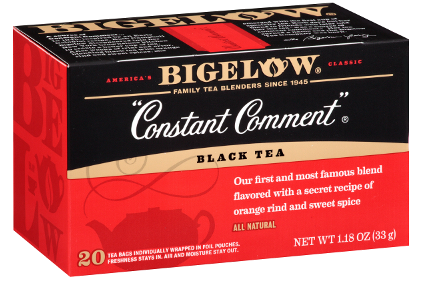 Bigelow Tea Company revealed their new design this spring with packaging now appearing on store shelves. The design took two years to implement. Boxes are easier to open and close and labels contain fun facts about Bigelow’s heritage. Descriptions engage buyers and the boxes include the name of the packer with a “best by” date attesting to freshness.
Bigelow Tea Company revealed their new design this spring with packaging now appearing on store shelves. The design took two years to implement. Boxes are easier to open and close and labels contain fun facts about Bigelow’s heritage. Descriptions engage buyers and the boxes include the name of the packer with a “best by” date attesting to freshness.
It wasn’t just a question of unifying their look and messaging across the different tea lines (herbal, green and black selections), explains Cindi Bigelow, third generation President & CEO.
“After nearly 70 years, our family tea recipes continue to delight consumers so we’d never think of changing them. Our commitment to exceptional quality, flavor and variety is what makes us the No. 1 Specialty Tea company in the U.S. After all these years however, it was time to refresh our look,” said Bigelow, whose firm sells 1.6 billion teabags a year.
“We wanted the boxes to work harder as communication tools,” said Bigelow. “We wanted to tell more of the Bigelow story – who we are as a company, as a family, our dedicated efforts to create the best recipes possible, and why it matters,” she said.
Last week Lipton unveiled a line extension targeted to the energy drink segment, a category that grew 60 percent from 2008-12, earning $12.5 billion in 2012, grossing more than the entire tea industry, according to market research firm Packaged Facts.
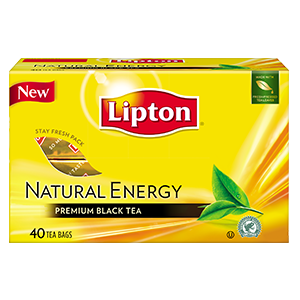 Lipton Natural Energy boosts caffeine to 75 mg per cup with 20 mg of L-theanine comparable to a cup of coffee. The tea is packaged in a new gold foil envelope visible through a cut out in the 40 ct. box. It retails for $4.29 or 10 cents per teabag, compared to 100 ct. offerings selling for 5 cents per bag.
Lipton Natural Energy boosts caffeine to 75 mg per cup with 20 mg of L-theanine comparable to a cup of coffee. The tea is packaged in a new gold foil envelope visible through a cut out in the 40 ct. box. It retails for $4.29 or 10 cents per teabag, compared to 100 ct. offerings selling for 5 cents per bag.
“Energy naturally drops throughout the day, but studies have shown that drinking tea on a regular basis helps people feel more alert, energized and attentive,” said Melissa Weingarten, Brand Director, Lipton North America. Lipton is the top-selling tea in North America.
That same week Good Earth re-launched their tea line with an attention-grabbing design and revamped fusions with new product names. Good Earth was founded in 1972 in Santa Cruz, Calif., was acquired by Tetley in 2005 and is now owned by Tata Global Beverages. Unlike Bigelow, Good Earth is advocating a change in how the brand is perceived (without abandoning proven formulations).
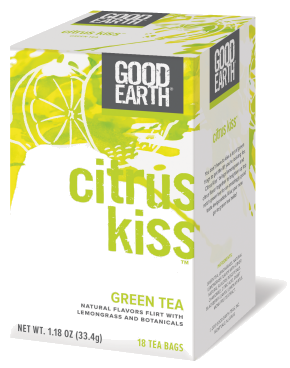 “The metamorphosis comes at a time of high competition in the packaged tea market, where the brand recognized an opportunity to differentiate itself from the sea of sameness among herbal tea brands,” according to the company. Good Earth’s Tea Untamed™ slogan embodies “the belief that tea is potent and powerful and, like life, should be explored and experienced.”
“The metamorphosis comes at a time of high competition in the packaged tea market, where the brand recognized an opportunity to differentiate itself from the sea of sameness among herbal tea brands,” according to the company. Good Earth’s Tea Untamed™ slogan embodies “the belief that tea is potent and powerful and, like life, should be explored and experienced.”
The line includes reliable favorites “but they have been made over with new names, new packaging and supercharged taste,” according to press release.
“Good Earth Teas are so unique and flavorful that we wanted the packaging and names of the blends to better reflect what is on the inside,” said Anna Corini, Marketing Executive, Good Earth. “There is a real difference between drinking tea and drinking Good Earth — and we want people to experience the untamed nature of our fusions on all sensory levels, from their first view of our packaging to the aromas and with each and every sip of these unparalleled teas.”
The company anticipates an “exciting future where tea breaks conventional boundaries to become part of a lifestyle full of endless possibilities. Examples include chocolate and chili-flavored Cocoa Tango™ and sweet Sweetly Twisted™ fusions with Citrus Kiss™, Wild Chaild™ and Matcha Maker™ all without any artificial ingredients.
The packaging changes are accompanied by a price hike. Bigelow stressed there are “no hidden reductions; same number of tea bags in each box and same amount of tea in each bag.” On the company’s website Sweet Dreams is priced at $17.75 or 15 cents per teabag and Pomegranate Pizzazz is listed at $19.75 for 120 teabags or 16.5 cents each.
“While prices are just slightly higher, this is due to increased cost of ingredients and raw materials. It is Bigelow’s first pricing increase in many years,” according to the company.
A comparable pomegranate green tea from Celestial Seasonings sells for $16.94 or 14 cents for 120 teabags.
While specialty shops such as Teavana and DAVIDsTEA easily sell loose leaf at $7.99 to $12.99 for as little as 100g and up (50- to 80-cents at 6g per cup), grocers report little success at these price points.
Grocery consumers, whether visiting value outlets like Wal-Mart or premium outlets like Whole Foods, are extremely price sensitive. Tea priced to sell in quantity needs to retail for around $5 for a box of 40 or $2.99 for 20 tea bags.
Wellness teas with antioxidant and other health claims are the exception, selling for significantly more. Celestial Seasonings’ new Metabo Balance Tea lists for $4.39 online for a box of 20 teabags or 22 cents per teabag while Bigelow markets its Herb Plus line of probiotic, antioxidant and vitamin enhanced teas in 18- count boxes for 16.5 cents a teabag.
Learn more: www.goodearth.com
www.liptontea.com|
www.bigelowtea.com
Accolades
In the past four years Bigelow Tea has sent more than 3.4 million tea bags (roughly 165,000 boxes), of American Classic tea to U.S. troops in appreciation for their dedication to America.
In the past year the company’s “Tea for the Troops” program delivered 15,000 boxes of tea to military overseas and in the states for a taste of home. American Classic Tea is 100% grown and produced on American soil at the company’s Charleston Tea Plantation on Wadmalaw Island, South Carolina.
“Sending our soldiers a little bit of home in the form of our American Classic Tea package is our way of recognizing and thanking them for the sacrifices they make so that we can enjoy the freedoms we all share,” said Cindi Bigelow, third-generation President and CEO.
Working in cooperation with the USO, the tea was delivered to Iraq, Afghanistan and other USO facilities where troops stay on their way to and from their deployment. Bigelow also distributed the tea at Veterans Administration hospitals and through VFW chapters.
To make its recent donation special, Bigelow Tea enlisted the support of the community at its recent Bigelow Tea Community Challenge to hand-write personal messages of gratitude and support.
Tea Biz serves a core audience of beverage professionals in the belief that insightful journalism is one of the most effective forms of professional education. We write about what matters along the entire supply chain, emphasizing trustworthy sources and sound market research while discarding fluff and ignoring puffery. If there is nothing we can add to your understanding of the issue, we leave it alone.
Tea Biz posts are available to use in your company newsletter or website. Purchase reprint and distribution rights for single articles or subscribe. Custom content available. Click here for details.



2 responses to “Need to Know (Nov. 11, 2013)”
Great information about the benefits of tea and health
[…] h/t Tea Biz – Need to know – Nov 11, 2013 […]